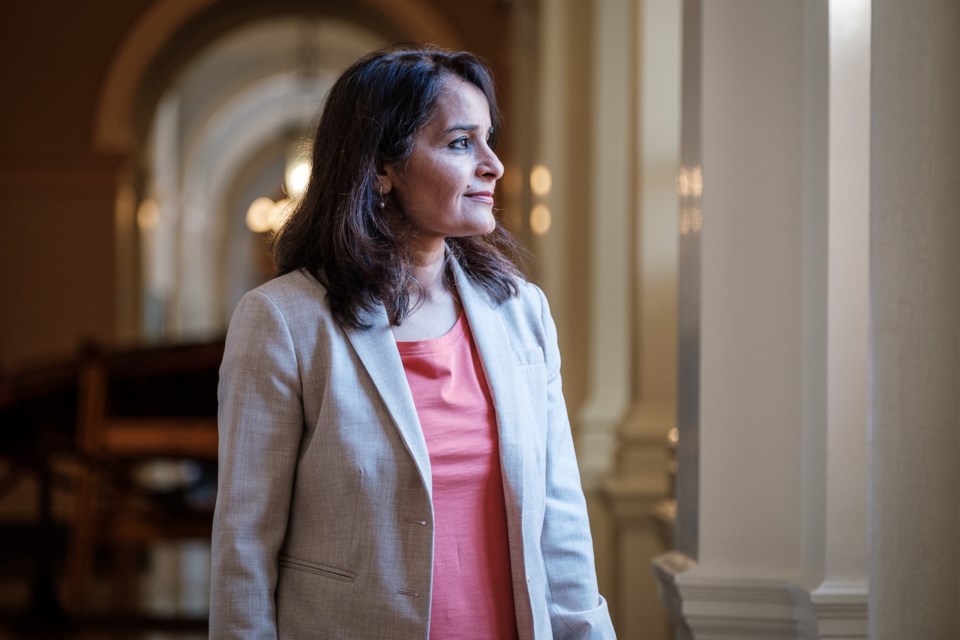Kids are returning to sa国际传媒 schools this week in record numbers, and that’s producing record political headaches for the NDP government.
Some are problems of its own making, such as the decision to forcibly end letter grades on report cards for students from kindergarten to grade 9, even though many teachers, parents and students appear to strongly dislike the idea.
Others are more broad, such as ballooning enrollment in the K-12 public system that has overwhelmed the NDP’s education funding at a time when inflation and labour shortages drag down more school construction.
“We know that more and more people are making British Columbia their home, and in the last two years more than 250,000 people have moved to British Columbia,” said Education Minister Rachna Singh. “Many school districts are facing enrolment pressures.”
Those pressures are playing out in all sorts of ways — a shortage of schools, a shortage of teachers, a shortage of education assistants, crowded classrooms and a proliferation of portables.
This year’s enrolment of 568,521 kids in the public K-12 system is up 8,172 kids from last year. It’s forecast to go up another 8,906 students next year, and 7,176 the year after that.
To put that three-year boom in perspective: The NDP built around 23,000 new student spaces over the last six years since it took power, and it will see almost as many new students arrive all over again in only the next three years.
sa国际传媒 hasn’t seen this kind of enrolment boom in almost two decades. It used to be common in the 1990s and up until 2001.
But then the number of kids in schools started dropping, a trend which continued until 2017. School districts spent the better part of those 17 years shutting underused facilities, consolidating schools and selling off land. Now, they are all scrambling to find locations to build new schools.
“We have education minister Singh announcing student spaces and additions to schools in the hundreds (of students),” said Opposition BC United education critic Elenore Sturko.
“So we're not even doing anything to keep up with the growth that we're having. Unfortunately, it's exponential, and we are going to continue to expect overages in the thousands — not just here in Surrey, but across the province.
“These small piecemeal announcements that are being made by the NDP education minister just simply won't cut it.”
Singh said the government is trying new approaches, including building more urban schools and securing land for future schools in communities before they are developed.
Although sa国际传媒 continues to spend billions on new school construction, the amount of schools this year has slowed compared to last due to problems caused by labour shortages in the construction sector and budgetary pressures caused by the rising cost of inflation, according to the education ministry’s service plan.
There’s also a teacher shortage to accommodate all these new students. That’s despite a generous new contract with the BC Teachers’ Federation that brought in extra pay for new teachers, recruitment incentives, more prep time and salaries that now top $100,000 for experienced teachers.
Amidst that kind of criticism and pressure, you would think the government would be tiptoeing carefully through the start of a new school year.
But instead it has charged head-long into another contentious area by choosing to end traditional letter grades for students from kindergarten to grade nine, replacing them with a “proficiency scale” of emerging, developing, proficient and extending.
Advocates, including the BCTF, say it more accurately gauges the depth of a student’s learning process. Critics say they are vague and meaningless, part of a larger cultural shift in which no one is allowed to compete or fail.
A significant majority of teachers, students and parents did not want the change away from letter grades when the government held public consultation on the issue in 2021.
And while the NDP prides itself on being a government that consults on everything from ticket scalping to liquor on patios, in this case, it simply chose to ignore the feedback and plow ahead anyway.
That’s left a political opening for the Opposition, which is already promising to restore letter grades if it wins the next election.
“It should be stopped, and we should go back to letter grades,” said Sturko. “Because ultimately, we’re hearing from students and families and even teachers that this is what they wish to do.”
The NDP doesn’t appear to be listening. But it can’t ignore the numbers — new students are pushing the education system to the max, and the government is failing to keep up.
Rob Shaw has spent more than 15 years covering sa国际传媒 politics, now reporting for CHEK News and writing for Glacier Media. He is the co-author of the national bestselling book A Matter of Confidence, host of the weekly podcast Political Capital, and a regular guest on CBC Radio. [email protected]


